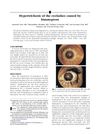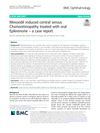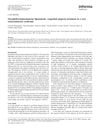 88 citations,
February 2010 in “JEADV. Journal of the European Academy of Dermatology and Venereology/Journal of the European Academy of Dermatology and Venereology”
88 citations,
February 2010 in “JEADV. Journal of the European Academy of Dermatology and Venereology/Journal of the European Academy of Dermatology and Venereology” Vitiligo is linked to autoimmune diseases and hearing issues, so hearing tests are recommended for patients.
 65 citations,
November 2004 in “Journal of the American Academy of Dermatology”
65 citations,
November 2004 in “Journal of the American Academy of Dermatology” Bimatoprost can cause excessive eyelash growth.
 57 citations,
May 2014 in “Molecular Phylogenetics and Evolution”
57 citations,
May 2014 in “Molecular Phylogenetics and Evolution” The research found how GPCR Class A Rhodopsin receptors are related and suggested possible substances they interact with.
 52 citations,
November 2003 in “Journal of Investigative Dermatology”
52 citations,
November 2003 in “Journal of Investigative Dermatology” Different harmful mutations in the CDH3 gene cause HJMD, but symptoms vary among individuals.
 52 citations,
June 1981 in “International Journal of Dermatology”
52 citations,
June 1981 in “International Journal of Dermatology” Oral retinoids are effective for severe skin conditions but require careful use due to side effects.
 51 citations,
November 2013 in “Drug Discovery Today”
51 citations,
November 2013 in “Drug Discovery Today” Small molecule drugs show promise for advancing regenerative medicine but still face development challenges.
 51 citations,
March 2006 in “Bioorganic & Medicinal Chemistry”
51 citations,
March 2006 in “Bioorganic & Medicinal Chemistry” Newly made nicotinamide compounds could potentially treat cancer.
 32 citations,
January 2007 in “Biological & Pharmaceutical Bulletin”
32 citations,
January 2007 in “Biological & Pharmaceutical Bulletin” Minoxidil and retinol together help hair grow.
 24 citations,
November 1974 in “Scottish medical journal”
24 citations,
November 1974 in “Scottish medical journal” Diabetes often causes various skin problems and complications.
 23 citations,
February 2020 in “PLOS genetics”
23 citations,
February 2020 in “PLOS genetics” Mice with LSS deficiency showed hair loss and cataracts, similar to humans, and can help in understanding and treating this condition.
 22 citations,
October 2012 in “Journal of Investigative Dermatology”
22 citations,
October 2012 in “Journal of Investigative Dermatology” Altered retinoid metabolism in cicatricial alopecia suggests a balanced vitamin A diet may prevent the condition.
 21 citations,
October 1978 in “The Journal of Clinical Pharmacology”
21 citations,
October 1978 in “The Journal of Clinical Pharmacology”  20 citations,
May 1985 in “British journal of nutrition”
20 citations,
May 1985 in “British journal of nutrition” Dietary essential fatty acids improved skin and hair conditions and partially corrected fat composition in diabetic mice.
 16 citations,
May 1982 in “Postgraduate Medical Journal”
16 citations,
May 1982 in “Postgraduate Medical Journal” Minoxidil can cause pericardial and pleural effusions with high protein content.
 10 citations,
January 2012 in “Lupus”
10 citations,
January 2012 in “Lupus” NEMO syndrome and systemic lupus erythematosus are linked in a new disease association.
 6 citations,
May 2020 in “JAMA Ophthalmology”
6 citations,
May 2020 in “JAMA Ophthalmology” Using 5-alpha-reductase inhibitors, drugs for prostate issues and hair loss, may lead to eye abnormalities in men.
 4 citations,
December 2022 in “Frontiers in cell and developmental biology”
4 citations,
December 2022 in “Frontiers in cell and developmental biology” Zebrafish larvae are used to study and find treatments for ear cell damage because they are easier to observe and test than mammals.
 4 citations,
June 2020 in “BMC Ophthalmology”
4 citations,
June 2020 in “BMC Ophthalmology” Minoxidil can cause a rare eye condition, but it was successfully treated with oral Eplerenone in one case.
 4 citations,
April 2020 in “bioRxiv (Cold Spring Harbor Laboratory)”
4 citations,
April 2020 in “bioRxiv (Cold Spring Harbor Laboratory)” The skin has about 230,000 touch-sensitive nerve fibers, with high concentrations in the hands and face.
 4 citations,
September 2013 in “Journal of Plastic Surgery and Hand Surgery”
4 citations,
September 2013 in “Journal of Plastic Surgery and Hand Surgery” A girl with a rare syndrome had successful hair loss treatment with no relapse after 4 years.
 4 citations,
April 2010 in “Expert review of dermatology”
4 citations,
April 2010 in “Expert review of dermatology” Restoring immune privilege in hair follicles could help treat certain types of hair loss.
 2 citations,
January 2022 in “Skin research and technology”
2 citations,
January 2022 in “Skin research and technology” OCT can detect hidden hair follicles in alopecia areata, indicating potential hair regrowth.
 2 citations,
December 2018 in “Journal of cosmetic dermatology”
2 citations,
December 2018 in “Journal of cosmetic dermatology” Higher CRBP1 levels are linked to more severe alopecia areata.
 2 citations,
July 2018 in “Elsevier eBooks”
2 citations,
July 2018 in “Elsevier eBooks” Some supplements may help with hair loss, but there's not enough strong evidence to recommend them without doctor advice.
 2 citations,
January 2018 in “Recent clinical techniques, results, and research in wounds”
2 citations,
January 2018 in “Recent clinical techniques, results, and research in wounds” Low-Level Laser Therapy helps heal wounds and regenerate tissue when used correctly.
 March 2024 in “GSC Advanced Research and Reviews”
March 2024 in “GSC Advanced Research and Reviews” Different light affects cell functions and can help treat skin conditions.
 January 2021 in “Journal of clinical and cosmetic dermatology”
January 2021 in “Journal of clinical and cosmetic dermatology” Human skin responds to light with protective mechanisms, but more research is needed to understand these processes and their implications for health and therapy.
 April 2018 in “Journal of Investigative Dermatology”
April 2018 in “Journal of Investigative Dermatology” Researchers found a substance in chicken egg yolk that helps hair grow.
 April 2018 in “Journal of Investigative Dermatology”
April 2018 in “Journal of Investigative Dermatology” STIM1 is essential for sweat secretion.
 April 2018 in “Journal of Investigative Dermatology”
April 2018 in “Journal of Investigative Dermatology” The keratin network in mouse skin changes during cornification and affects the skin's protective barrier.






























